Dada about data at Cabaret Voltaire
Publié le 8 mars 2016 par Annick Rivoire
On March 4-5, some 7,000 people followed the livecast of dada-dataesque lucubrations by 80 poets, hackers, media artists and other glitchers united in Zürich for the Great Dada Manifesto. A hack-homage to 100 years of dada, springboarded by David Dufresne and Anita Hugi’s “Dada-Data” webdoc, in partnership with Makery.
Zürich, special report
How are a humpback whale, a urinal-webcam, costumes inflated by the hashtags “grosse” “manifesto”/“dada” and a pineapple poet all related? Actually, they aren’t. Yet, in Zürich on March 4-5, before the lenses of cameras disguised as Elisabeth van da Lipp, Sophie Dadako and Robert da Dashian, the whale, the urinal, the poet and the data all jammed together joyfully in honor of the Great Dada Manifesto. It was a festive, sophomoric, crazy-mad and therefore indescribable event, orchestrated by the two authors of Dada-Data, a digital cabaret web documentary that pays tribute to the dada movement’s 100th anniversary.
Sophie Dadako is ready for the #dadadata #livestream - so is @zhdkcast ! #zhdk #dada @DadaDataCabaret pic.twitter.com/IKzD4L7td7
— Eloy Martinez (@EloyMMartinez) March 2, 2016
As a partner of this DadaDataThon, Makery was there, for (almost) 30 hours of live netcast (watch it here). We tried to prepare, like some of the 80 participants from all over (mostly French-speaking, but also German, Italian, Romanian, even Argentinian), by concocting a Datadadadata interview machine, along with Albertine Meunier and Sylvie Tissot. It was a program that strung together fragments of questions by randomly accessing a database of names, places, adjectives and adverbs supplied by the team around the organizers’ chosen theme: “war, dada, data”.
The machine in question was programmed in 2011 with Thomas Baumgartner for France Culture and updated by coder Sylvie Tissot. We fed it new words and questions (including GAFA, state of emergency, Trump and other dataish vocabulary), then went off to Zürich in order to test it on all the participants.
1st dada interview with the datadadadata machine. Question: Have you ever stolen Bill Gates’s data on rue Quincampoix in Paris, and if not, why? Answer: Not for data or Bill Gates or in any case would I find myself on rue Quincampoix in Paris, because I’m self-exiled in the provinces and I hate Paris. Jean Songe, live from Cabaret Voltaire for the Great Dada Manifesto.
But as this was none other than a dada marathon, surprise was in the air. Others had also prepared dodo, emoji, Twitter manifestos… as their contribution to this “dada digital manifesto” in progress announced by the event’s organizers: David Dufresne, author of famous webdocs (Fort McMoney, Prison Valley…) and pointed investigations (Tarnac, magasin général); and Anita Hugi, producer of documentaries for Schweizer Radio und Fernsehen (SRF) and expert on the dada movement (she initiated two documentaries on dada and Sophie Taeuber-Arp).
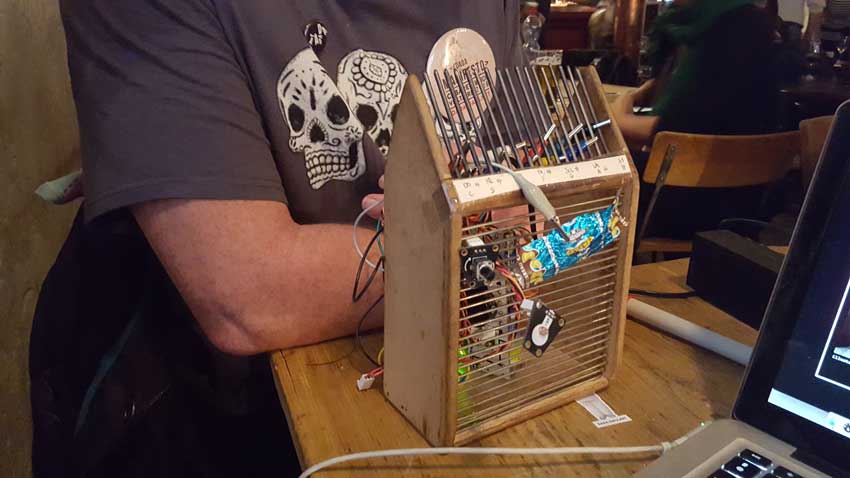
This unpredictable intention was reaffirmed in pure dada spirit by “master of ceremonies” McKenzie Wark in person, who beforehand “committed” a devilishly political and subversive RetroDada Manifesto. Declaimed in four voices and four languages to inaugurate the event on March 4, he encouraged us to revisit the spirit and the breath, humor, derision and joyous despair that a bunch of poets and artists (Hugo Ball, Sophie Taeuber, Tristan Tzara… all the way to Duchamp) breathed into war-torn Europe in 1916.
RetroDada Manifesto by McKenzie Wark, David Dufresne, Molle Industria and Anita Hugi. In 4 languages!
Media artists had set up tweet-actions (the cool E-Real Novella by Swiss collective W2rkH0f), others were invited as keynote speakers (the curator all the way from the International Dada Archive in Iowa, and Joël Vacheron, co-author of Dadabot, as covered here). The French trio of joyful data-dadaists Albertine Meunier, Julien Levesque and Bastien Didier planned to perform the 2014 Datadada Manifesto (during which their recycled costumes would inflate whenever the words “dada”, “manifesto” or “grosse” were tweeted online), in addition to a game-performance to flame OK Google and its animal sound recordings (in French only). In short, all these hackers, media artists, theorists, journalists and bloggers, students from Zürich University of the Arts (which streamed the event), came prepared.
However, in a very dada way, nothing or almost nothing went according to plan.
“Badaboum la data c’est GAFA” Albertine Meunier Julien Levesque and Bastien Didier crack fire with Twitter.
Cabaret Voltaire, where the dada movement was born, and its thick walls, acted up. The Canadians (delegates of the Akufen web design studio, which built the Dada-Data webdoc) couldn’t connect to the wifi, which became quite unreliable once all (or almost all) 80 participants tried to download a maximum amount of data.
McKenzie Wark’s “icebreaker” activity to play a game with texts from famous writers (Raymond Roussel, Perec, Debord, Rimbaud, Burroughs…) was reminiscent of an art school workshop. The “French table” set off a few firecrackers inside paper rolls featuring dada slogans, then wrote “dada voit too” (dada sees all) with breadcrumbs and cherry tomato stems. DIY indeed, but not quite data! At the open mic, people slammed and sang in a number of languages, as the evening started off under strong dada influence.
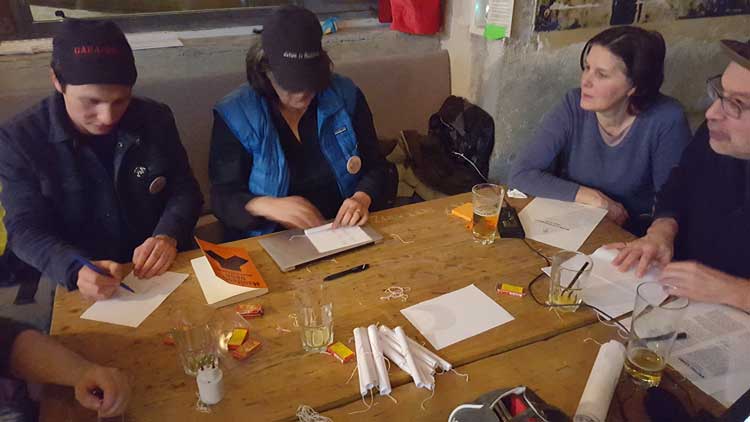
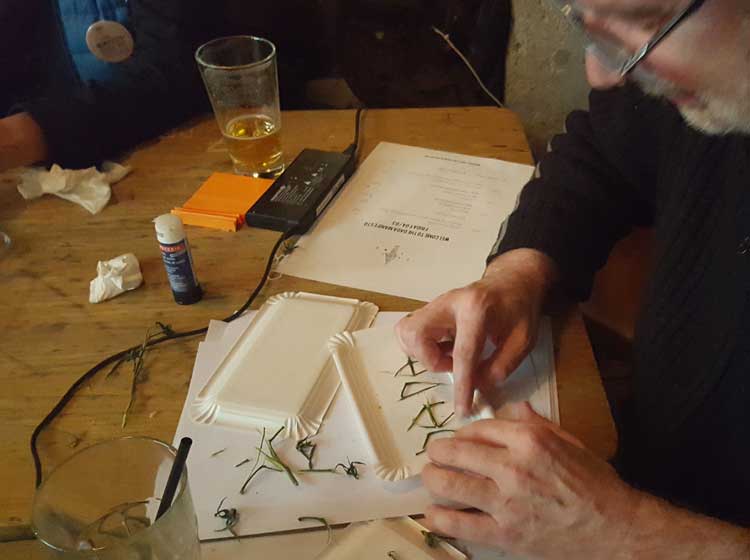

Then data entered the picture. Joël Vacheron talked about the creolization of data… or how some artists reappropriate algorithms to deviate the machine. Paolo Perdercini, from Molle Industria, a collective that makes radical games (anti-Pope, anti-McDonald’s…) hammered in the nail: “Of course, we are dominated by algorithms,” and the only solution is to “move fast and break things.” His brillant demo of an online kit for dada digital manifestos went by fast. He didn’t think of documenting it for the participants, who will remember at best the website Cheap bots done quick (to build a Twitterbot in 10 minutes).
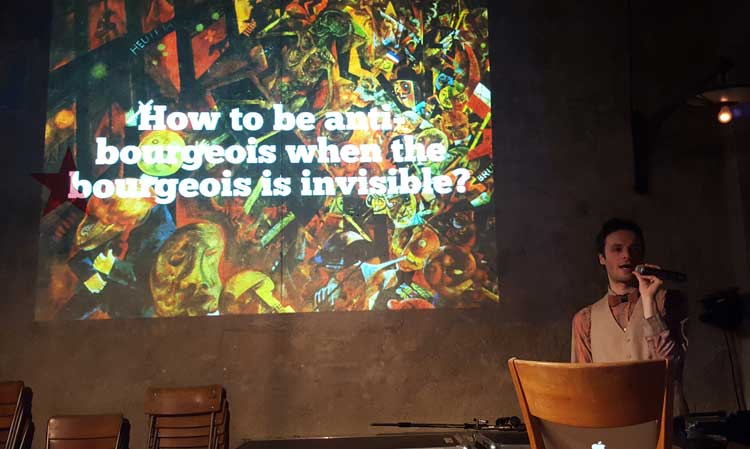
While nibbling on (Swiss) cheese, some worked hard on text collages, war-themed theater-happenings, modified programs to glitch a manifesto, while others discussed migrants or the economic crisis over a beer, took in the night air of Zürich, or even went to sleep. At 4 AM, only a handful were left (4 in front of the computer, 2 sleeping). At 11 AM the next morning, Le Cri du Dada, performed by the troupe of Albertine Meunier, Julien Levesque and Bastien Didier, introduced a new momentum, provoking collective giggles and a welcome fusion between dada spirit and data spirit.
McKenzie Wark imitated a zebra (not an easy task), blogger Nicolas Bole did a perfect turkey imitation, David Dufresne and writer Jean Songe impersonated humpback whales… while the artists distributed baseball caps bearing the slogans “GAFA TOI” and “Dada pépettes”, dada underwear and coasters that read “la Data c’est GAFA, la Datum c’est Badaboum”.
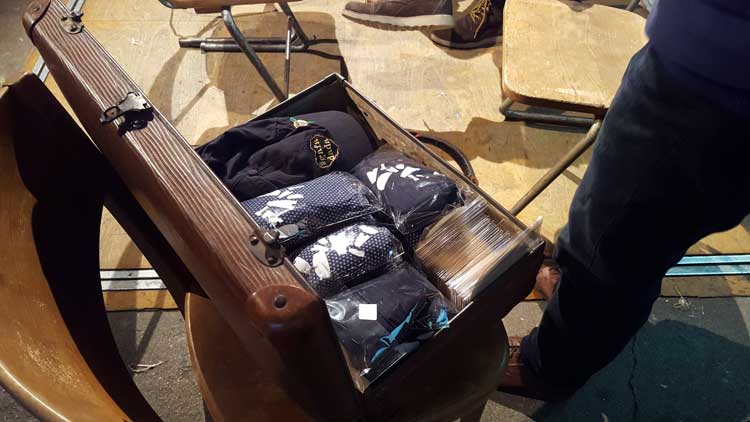
By early afternoon, some were already pitching the next dada manifesto, some were declaring it “no tech”, others (including the French table) talked about text triggered by brainwaves alones. Code, glitch, poem, the theater play had disappeared, the Argentinian artist recited a text written a la mano in Spanish. What’s going on here?
Post-dada mill
While Swiss folk-rock group The Dead Brothers (who composed the Dada-Data soundtrack) occupied the room with an interminable soundcheck (Cabaret Voltaire is more favorable to declamation than to multi-instrument concerts), the organizers informed the participants that they would have 5 minutes to present their manifesto. In order to wrap up Dada-Data quickly and start the concert on time (free and scheduled for 8 PM), everything went very, very fast.
“I’m claiming my 5 minutes,” declared David Dufresne after the fact, when asked about the manifesto mill. “Concision is essential.” Nevertheless, from one language to another, from one medium to another (Twitter, iPhone voice recognition, collage, pineapple, openBCI…), we hardly had time to understand the projects: a matrix dada code by up-and-coming Swiss collective Fragment-in, a manifesto glitched using the open source software Pixel Drifter, the French table’s Mentalisto Dada Manifesto (words collected from the room related to the three keywords dada, data, guerre, a bilingual database for the machine to scroll the words, which Bastien will stop by the force of thought… using an OpenBCI to capture brainwaves, which will be sent to the printed roll, which Jean Songe will read to the audience…).
At full speed, the manifestos came and went, each one different from the next. At the same time, who could pretend to access the power of the original manifesto? David Dufresne said it best: “We’re all losers, so everybody won.”
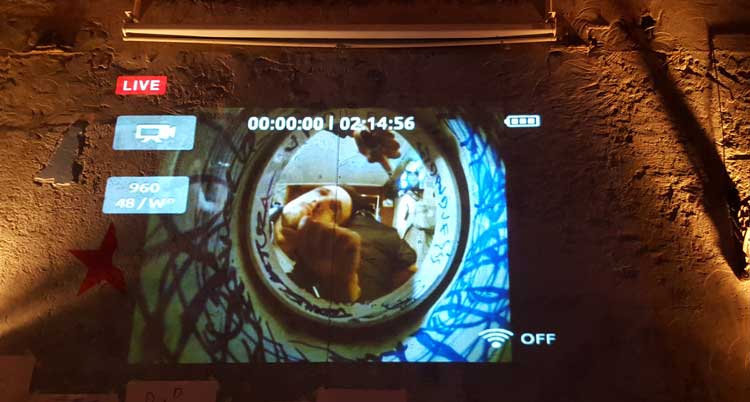
In a few days, Dada-Data, which attracted no less than 180,000 online visitors since February 5 and was viewed about 7,000 times during the Great Dada Manifesto, will feature video recaps of the event. Will absurdity and poetry, deregulation and anti-GAFA glitches have the power of dada? At Cabaret Voltaire, dada merchandizing of dada soaps and memo pads, gives us some idea. Are the urinals printed one after another by the three 3D printers set up during Dada-Data at Cabaret Voltaire still subversive? Do avant-gardes have any other fate than to be swallowed up (by advertising, media, consumer society, capitalism, etc.)?
“Dada-Data” webdoc by David Dufresne and Anita Hugi
French daily newspaper Libération reporter Amaëlle Guitton wrote about the event here and here
Nicolas Bole tweeted the event for Le Blog documentaire
On Makery’s live site, see the dada machine interviews of Anita Hugi, Paulo Ahumada Rovai, David Dufresne, Nicolas Bole, Laura Perrenoud, Ivan Gulizia, McKenzie Wark
